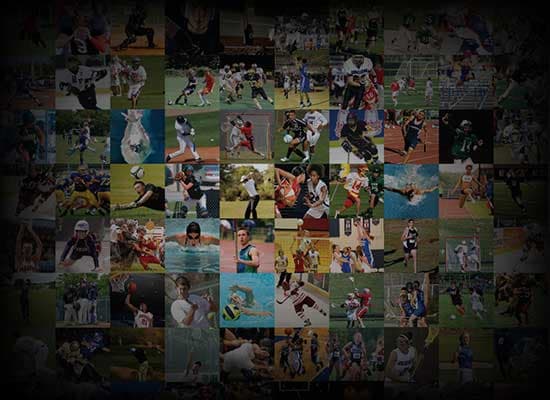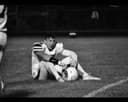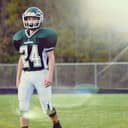
 2021-22 Highlights
2021-22 Highlights  Malek Highlights
Malek HighlightsI am a first-generation American, born and raised in the Midwest to a Laotian mother and a Palestinian father. This was a second marriage for my mother. My sister and I were raised with two older half-siblings. We are a close-knit family, bound by compassion and cultural differences. I am proud of my rich cultural heritage, but my parents have faced many socio-economic barriers in America. We dwelled in a cramped, two-bedroom apartment, though my half-brother bounced between our home and his father’s. I admired my sociable older brother who shared time and toys with me. It was with his Legos that I honed my manipulative skills, which came in handy when I later took up sports. I developed a passion for mathematics in school. Numbers fascinate me, and I enjoy the diverse problem-solving strategies employed in math lessons. I also swiftly developed communication skills with sign language, learned from my partially-deaf older sister when we attended Milwaukee Sign Language School. I delighted in communicating with her and other deaf classmates at that specialty school. Becoming aware of the many obstacles silently faced by members of the deaf community helped me develop greater compassion for others and a personal determination when facing obstacles in my own life. I was deeply dismayed to leave my deaf friends behind when we transferred to another public school.
When switching schools, my family relocated to a three-bedroom townhouse. This may sound like the lap of luxury, but my father was still working an unstable job, selling and repairing phones at a nearby suburban mall – a mall where my family could not afford to shop. Furniture was simply unaffordable as our limited family income fluctuated wildly. For months, my parents slept on a bare mattress placed on the floor. My mother was miserable, knowing that her family had to do without. She would cry in the middle of the night when she thought we would not hear her sorrow. The daily difficulties of their lives -- the sadness, the poverty, the uncertainties – motivated me. I became determined to pursue a career that could financially provide not only for myself, but also allow me to take care of my family. I honed my competitive skills in school by joining sports teams -- soccer, football, basketball, and softball. I developed acute playing skills on the field and positive friendships with teammates whom I soon viewed as a second family. With athletics I learned to not just consider my duties but also the responsibilities and needs of my teammates. I learned to step up when needed and to collaborate for best outcomes. I always seemed to work harder than everyone else, not just in sports but, more importantly, in the classroom. Yet my prioritization and tenacity have led to my continued success.
I learned about aerospace engineering in middle school when a benevolent science teacher discussed space-related careers. He led me to space technology, encouraging me to pursue not just that career goal, but other personal objectives. He mentored positivity and optimism, characteristics I embraced to rise above our family’s hardships and to succeed in middle school. I learned to ignore distractions and built a strong resume, capturing a seat at a nationally-recognized International Baccalaureate high school. At Reagan High School, I found cultural acceptance within a diverse population that embraces the IB values of open-mindedness and global awareness. Participating in many extracurriculars -- DJ club, jazz band -- taught me to step outside of my comfort zone and take calculated risks. As a three-time varsity athlete -- football, swim, and tennis -- I’ve learned how to balance assertiveness with kindness, steadily seeking collaborative solutions to benefit my entire team.
Like millions of others, I lost a year of “standard” education to the Covid-19 pandemic. My junior year was spent isolated, in front of a laptop screen. School clubs disappeared. Sports seasons were cancelled. Student-teacher relationships eroded. Friendships collapsed. Negative behaviors and unhealthy emotions swirled around the pandemic. Students fell into depression, some unable to finish the school year. Overcoming this endless, collective obstacle was a life-changing experience which we were not unprepared for. I am proud that I maintained my aspirations through it all. With humor and optimism, I am upholding the same standards that I had set in the beginning of my high school years. I have steadfastly faced the Covid crisis, unwilling to abandon my plans. I will finish strong in my senior year and earn a seat in MIT or Stanford, universities my father hails as the best institutions for STEM education. Inspired by the brilliance of Neil Armstrong and Elon Musk, I will pursue aerospace engineering. Moving beyond the obstacles of 2020, I continue to do more than what is expected. I continue to hope, to strive. I will achieve my personal goals for lifelong success.
| Statistic | 2021 Varsity Team | 2018 Junior Varsity |
|---|---|---|
| Assisted tackles | 33 | 3 |
| Pass break-ups | 1 | |
| Solo tackles | 23 | 2 |
| Tackles for a loss | 2 | |
| Returns | 2 | |
| Total return yards | 82 | |
| Yards per return | 41.5 | |
| Receiving yards | 12 | |
| Receptions | 1 | |
| Touchdown receptions | 1 | |
| Yards per reception | 12 |







